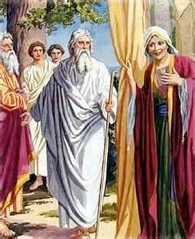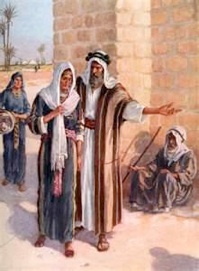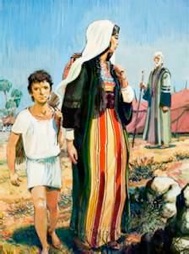Bible Stories for Young Adults



Sarah - True Femininity

In the eleventh chapter of Hebrews, which is called the "faith chapter,"
fourteen men's names and two women's names are given as examples of faithful
persons in the Old Testament. One of those women is Sarah who we may call
the "mother of the faithful" since her husband Abraham was called the
"father of the faithful."
Sarah was the woman that the Apostle Peter gave as an example to married
women. Peter said that wives should be submissive to their husbands, so that
even if the husband is an unbeliever he may be won by the behavior, not the
words, of his Christian wife. They should be able to observe both purity
and reverence in their wives and a beauty that comes from within. A woman's
outward beauty, which is enhanced by make-up, hairdos, jewelry, and fine
clothes, is nothing to be compared to the unfading beauty of a gentle and
quiet spirit. Peter said, "The holy women of the past made themselves
beautiful in this way, by being like Sarah who submitted to her husband
calling him her master." (I Peter 3:1-6) Today's Christian women are
Sarah's daughters, he said, if they do what is right and have faith rather
than fear.
Perhaps the most amazing stories of Sarah's faith are implied by what she
did when her great outward beauty became a liability for her husband.
(Genesis, chapters 12 through 21. If you use this link press > to go to subsequent chapters.)
Soon after God called Abraham to leave his home country for Canaan, there
was a famine in the land. So Abraham left Canaan for Egypt, but he feared
that when the Egyptians would see his beautiful wife, they would kill him
and take her. This was a common custom then and it sometimes happens in
that part of the world even to this day. So Abraham told Sarah to report
that she was his sister so that he would be treated well.
What followed was exactly as Abraham had guessed. Pharaoh's officials saw
Sarah, reported her beauty to Pharaoh, and she was taken into his palace.
At this point we must think of what may have been transpiring in Sarah's
mind. It was customary for women who were newly taken into a harem to go
through several months of preparations before being presented to the king.
During this time, Sarah must surely have stormed the gates of heaven with
her prayers. She was no longer a beloved wife, but the mere property of a
proud heathen king. No godly woman wants to be used in such a way!
The scripture says, "The Lord inflicted serious diseases on Pharaoh and his
household because of Abraham's wife Sarah." So whose prayers was God
answering? Sarah's! The diseases that Pharaoh and his household had caused
a further delay in the time that Sarah would be expected to go to bed with
Pharaoh! Somehow Pharaoh found out that the reason that he and his
household were suffering was because Sarah was not Abraham's sister, but
because she was his wife! More than likely, Sarah was the one who told him!
She told the truth, though Abraham had asked her to tell a lie!
Sarah's desires to be released from Pharaoh and returned to Abraham, with
neither he nor she being harmed, were granted. Not only that, but Pharaoh
sent Abraham away with all that Abraham had been given by Pharoah, which
included animals and slaves. But this was not the only time Sarah's faith was
tested, and her obedience to Abraham challenged.
Sarah knew that God had promised Abraham offspring, but because she was
barren and well past her childbearing years, she must have thought that God
would send Abraham's posterity by another woman. After all, Sarah had seen
that the Pharoah of Egypt had multiple sexual liaisons in his harem, so why
couldn't Abraham have another wife? Since Sarah did not understand that
Abraham's promised son would come through her own womb, she told Abraham to
take her maid Hagar and raise up a family through her. Obviously, neither
did Abraham understand that his son would come from Sarah's womb. Hagar
did get pregnant by Abraham, but this caused problems due to Hagar's pride.
Hagar no longer she felt she had to submit to Sarah, so Sarah dealt harshly
with her. When Hagar ran away, the Lord spoke to her and told her to return
to Sarah and to submit to her.
Thirteen years later, when Sarah was 89 years old and Abraham was 99, the
LORD came to Abraham's tent and said, "This time next year Sarah your wife
will have a son." Sarah, unseen but hearing this as she stood inside the
tent, laughed to herself. The LORD asked Abraham, "Why did Sarah laugh and
say, 'Will I really have a child, now that I am old'?" In fear Sarah denied
that she had laughed, but the LORD who knew her every thought said, "Yes,
you did laugh." Perhaps this supernatural knowledge that this messenger had
of her innermost thoughts convinced Sarah that the messenger also really
knew that she would have a baby within one year.
But then, even this faith was tested. Now she believed she would have that
son of promise, but immediately thereafter Sodom and Gomorrah were
destroyed, so Abraham moved his household to Gerar where Abimelech was king.
Abraham conveyed the same deception he had in Egypt, saying that Sarah was
his sister, rather than his wife. Therefore, King Abimelech took Sarah into
his harem.
Again, Sarah had to exercise faith. She was now supposed to be getting
pregnant by Abraham, but here she is displaced in a heathen king's palace!
How could she become pregnant with Abraham's son being here? Her plea to
God must have been perched atop God's own promise of the son she was to
bear for Abraham. Perhaps she said, "LORD! This heathen king who has taken
me as chattel and taken me from my husband! You promised -- and your
promises never fail -- you promised that I would have a son by my husband
by this time next year! I know you will get me out of this place and back to my
husband so there will be no question about whose child I bear!"
Immediately God closed the womb of every female in Abimelech's household
because of Sarah. Soon God appeared to Abimelech in a dream and told him
that he would die because of Sarah, a married woman. Abimelech had not
touched her, so he cried out to God, pleading his innocence because he had
been deceived by both Abraham and Sarah and did not know they were married
to each other. Not only that, Abimelech feared that God would possibly
destroy his whole nation on account of this, for a king's morals set the
tone for the nation he rules. Perhaps he also feared that God would make
other women in the nation barren, as had happened in his household.
The Lord answered Abimelech and let him know that God Himself had not
allowed Abimelech to come near Sarah. God Himself had kept Abimelech from
sinning. God told Abimelech to immediately return Sarah to her husband or
he would die, as well as all that belonged to him. But if he returned
Sarah, then Abraham, a prophet of God, would pray for him and he would live.
The next morning Abimelech called all his officials and he told them about
his dream. They were afraid. Then he called in Abraham and asked, "Why
did you do this to us? Why would you bring guilt upon me and my kingdom?"
Abraham admitted that he did not believe there was any fear of God in this
country and he feared for his life because of Sarah. Abimelech then gave
animals and servants to Abraham and returned his wife to him. He also gave
Abraham a thousand shekels of silver to cover the offense against her. Soon
after her return to Abraham, Sarah became pregnant with Isaac and bore
Abraham this son when she was ninety years old.
Though Sarah is given as an example of a submissive wife, she certainly was
not a "doormat." Neither was she treated as a slave by her husband. In
fact, when Isaac was very young, on the day he was weaned, she noticed that
Ishmael, a teenager, was mistreating her son Isaac. She realized the two
boys could not grow up together for she could not tolerate the abuse that
Ishmael dealt Isaac. She ordered Abraham, "Cast out the bondwoman and her
son."
Abraham was very grieved at Sarah's demand to put Hagar and Ishmael away,
for his manly instinct was to provide for and protect them. Yet, God spoke
to Abraham and told him to do as Sarah said. God then took it on Himself
to be with Hagar and Ishmael and to see that they were cared for.
Godly Womanhood
Through the life of Sarah we can see that God intends for women to be full
of faith, resting on His promises, and submissive to their husbands. Older
women are to be reverent in the way they live, not slanderers, but teaching
what is good to younger women and children. Younger women are to love their
husbands and children and to be self controlled and pure. They are to be
keepers of the home and kind. If Christian women are not behaving in this
way, others will malign the word of God. (Titus 2:3-5) Women are to dress
modestly, decently and properly. A woman is not to usurp authority over the
man at home or church.
Proverbs 31:10-31 also gives characteristics of the virtuous woman. She can
be trusted. She is not a selfish spendthrift. She doesn't cause any harm
to her husband. She works eagerly shopping for or making clothes for her
household, as well as preparing meals. She may even plant a garden or
invest her money in real estate or have a home business. She aids the
needy, speaks with wisdom, and instructs others kindly. She watches over
the business of her household and is not lazy or a time-waster. She is
strong and dignified and hopeful as she looks to the future. She is the kind
of woman that her children praise and that her husband praises. Above all,
she fears the Lord.
Going back to the Garden of Eden and the way God made woman, even nature
teaches us some things about what God wants a woman to be like. Eve was
created to be a companion to Adam, because it was not good for him to be
alone. Eve was created to be a helpmeet to Adam as he set about to subdue
the earth, using natural resources for man's good and God's glory. Adam's
tasks included having dominion over the animal kingdom and to tending the
garden. We see women helping in these areas a great deal through scripture.
However, the most obvious difference between a man and a woman is that the
woman was created to bear children. She would be the one to tend the nest,
nurturing the children. She was given the physical ability to nurse her
little ones at her breast. Therefore, it is only natural for the woman to
want to bear children, to be near them in their youngest years, and to be
concerned for their health and training.
The Lies of Feminism
In 1966, the National Organization of Women was formed. These angry women
wanted to have "free sex," forego childbearing, and become more like men.
They detested Biblical patriarchy and did not believe a woman should submit
to her husband. These ideas, along with the growth of the Nanny State,
where the state would provide cradle-to-grave security, diminished the value
of men in society. Women's Studies on college campuses even taught that
women should be spelled "womyn," and that they should keep their maiden name
if they married. Feminists did not believe any woman could be happy as a
"homebody" mother, but needed to have a well-paying career to be fulfilled
in life. Their hatred of men did not stop there. Suddenly we were hearing
that pronouns referring to God should not be the masculine "He" or "Him."
"Mankind" was no longer a valid word and even the hymnbooks in churches
changed such words as this. Finally, the most rabid feminists forsook
Christianity altogether and turned to witchcraft or worship of the goddess,
and then to lesbianism, which is the unholy progression described in Romans
1:18-32. As women and blacks claimed precedence over others, white males
found it more difficult to get a job, especially in civil service, and this
is a problem that persists to this day.
The goal of feminism was not only to destroy patriarchy, but to destroy the
family. Housewives were said to be "parasites" and "less than fully human."
Proverbs 14:1 says, "The wise woman builds her house, but with her own hands
the foolish one tears hers down." However, the feminist doesn't want to
stop at tearing her own house down; she wants to tear down everyone else's
too! A married women who follows the foolish feminist ideology ends up
being like decay in her husband's bones. (Proverbs 12:4) Basically, the
woman influenced by feminist thinkers is rebelling against the creation
principle. Adam was first created, then Eve, so from creation he was to be
the leader. ( I Timothy 2:13). Though Adam followed Eve's leadership when
she offered him the forbidden fruit, the Lord reasserted Adam's place as the
leader afterwards by saying to Eve, "He will rule over you." The ungodly
woman tries to rule over her husband by nagging him, shaming him, or
otherwise threatening his rightful role. She will become an unloved
married woman under whom the earth trembles, under whom the earth cannot
bear up. (Proverbs 30:21-23).
My father was trained as a pilot in World War II. He was a hardworking,
thrifty man who made sure his family was in church three times a week. He
could fix anything that broke. He was the "boss" and truly masculine. But
there was definitely one kind of woman he detested -- the "bossy" kind.
They were not attractive to him in any way, and I suppose that is how it is
with any man who values his manhood.
So, if a woman wants to be fully woman --a feminine type instead of a
masculine type--she must decide to let her husband be the leader. She may
do as Sarah did in making suggestions -- some of which may not be good and
some of which God may approve -- but the final say-so will be his. If she
thinks his say-so is wrong, then she must appeal directly to God, as Sarah
surely did when she was twice imprisoned in a harem.
The woman of faith will always have God as her protector and provider, even
if a husband fails to do his part.
Discussion
1. Of all the characteristics of Sarah, what do you think was the most
significant?
2. What other characteristics of a godly woman are important?
3. If you had been in Sarah's position when your husband asked you to do
something like Abraham did, how would you have reacted?
4. How did God first get Pharoah's attention when Sarah was in his harem?
How did he first get Abimelech's attention?
5. How did Abraham misjudge Abimelech and the people in his country?
6. Though Abimelech was a heathen king, he feared that any sexual sin with
a married woman would bring God's judgement on not only himself or his own
household, but also upon his nation. Does his fear have any basis in
reality? Why or why not?
7. How was Sarah's outward beauty a detriment to her and to Abraham?
8. Why did Abraham have a child by Hagar?
9. Why was it especially an inconvenient time for Sarah to be placed in
Abimelech's harem?
10. Why did Sarah finally order Abraham to cast out Hagar and Ishmael?
11. In what ways are Christian women told to be like Sarah?
12. What are some other characteristics of the truly feminine woman? How
does being feminine differ from being "sexy."
13. From the ways and reasons Eve was created in the Garden of Eden, what
do we learn of the God-intended role for women?
14. What are some of the lies of the feminist movement that began in 1966?
Dig Deeper
1. Read Hebrews 11. What two women are mentioned here as examples of
faith?
How many times is Sarah's husband Abraham mentioned in this chapter?
2. Read I Peter 3:1-6. What instructions are given to women here?
3. Read Genesis, chapter 12. How old is Abram in this chapter? Is there
anything in this chapter which would tell Abram that his offspring would
come through Sarah? Why did Abram want Sarah to say to the Egyptians that
she was his sister instead of his wife? How did Sarah's beauty help Abram
acquire more wealth while in Egypt?
4. Read Genesis 15. In this chapter God speaks of Abraham's descendants
when as yet there were none. How many times did God refer to Abram's
descendants, offspring, or a son? Does God say that his son coming from his
own body would also be Sarah's son?
5. Read Genesis 16:1-2. After Abram left the Pharoah of Egypt, he returned
to Canaan. How many years had Abram lived in Canaan when Sarah told him to
have a son by Hagar?
6. Read Genesis 16:3-15 What were Sarah's words or actions in this
passage that do not seem "right." How did God show He cared about Hagar?
What were the prophecies concerning Hagar's son? The Arabs claim to be
descendants of Ishmael. In what ways has this prophecy concerning Ishmael
come true? How old was Abram when Ishmael was born?
7. Read Genesis 17. God continues to speak of Abraham's descendants. In
this chapter does God make it clear that he will have a son by Sarah? How
old was Abraham at this time? What did God say about His plans for Ishmael
in this passage?
8. Read Genesis 18:1-15. How did Abraham show hospitality to the three
visitors. What important announcement did the one that was called the Lord
make? The name Isaac means "Laughter." Why is that a fitting name for this
child, based on what happened in this chapter?
9. Immediately after the three visitors left Abraham, Sodom and Gomorrah
were destroyed. Then Abraham moved to Gerar. Read Genesis 20 to see what
happened there. Describe Abimelech. How did Abimelech enrich Abraham?
Contrast this with Abraham's attitude about receiving wealth from the
Sodomite king in Genesis 14:22-24. Why do you think there is a difference?
How did Sarah submit to Abraham in this chapter? Why was this a very
inconvenient time for Sarah to be in Abimelech's harem?
10. Read Genesis 21:1-7. How old was Abraham when Isaac was born?
11. Read Genesis 21:8-20. Why did Abraham follow Sarah's order to get rid
of Hagar and her son Ishmael? How did God show that he preferred Isaac,
but at the same time cared about Ishmael?
12. Read Titus 2:3-5. How are older women to behave? Younger women?
13. Read Proverbs 31:10-31. In what ways was your mother like this woman?
14. Read Genesis 1:26-28. What orders did God give man?
15. Read Genesis 2:18-25. Why did God create woman to be with the man?
16. Read Genesis 3:16. What were the curses associated with sin on the
woman? What does I Timothy 2:11-15 have to say in comparison to this?
17. In what ways does modern feminism compare to the stages of decadence
described in Romans 1:18-32?
18. Read these three passages in Proverbs: 14:1, 12:4, and 30:21-23. In
what ways are modern feminists described here?
19. What balances are given to the married in Colossians 3:18-19,

Since the advent of the extremist feminist movement in the late 1960’s, we have almost forgotten what God’s design for womanhood is like. Read this study on Sarah to find out what a woman of faith is like. She is not a “doormat,” yet she is deeply respectful of her husband at all times. She may be a woman of great beauty as Sarah was, but she also knows her beauty can be a liability when it comes to her moral safety. See how Sarah’s God brought her out of a dangerous and ungodly situation to become a great woman in the history of the world.






Sarah’s great outward beauty was matched by her inner beauty with faith in God and respect for her husband.
When Abraham took Sarah to Egypt, Pharoah took Sarah into his harem because she was beautiful.
Due to God’s intervention, Pharoah ordered Abraham and Sarah to go.
When Sarah, a barren woman at the age of 89, overhears that she would have a baby in a year, she laughs.
After another test of her faith in King Abimelech’s harem, the beautiful Sarah is again rescued by God.

Isaac, the son of promise, was finally born when Abraham was 100 years old.
To protect Isaac from the bullying of Ishmael, Sarah demanded that Hagar and Ishmael be sent away.

Bossy woman in the making.

The feminist movement definitely was not made up of feminine women. Though feminists want to usurp male authority at every level of society, God says the man will rule
over the woman.
